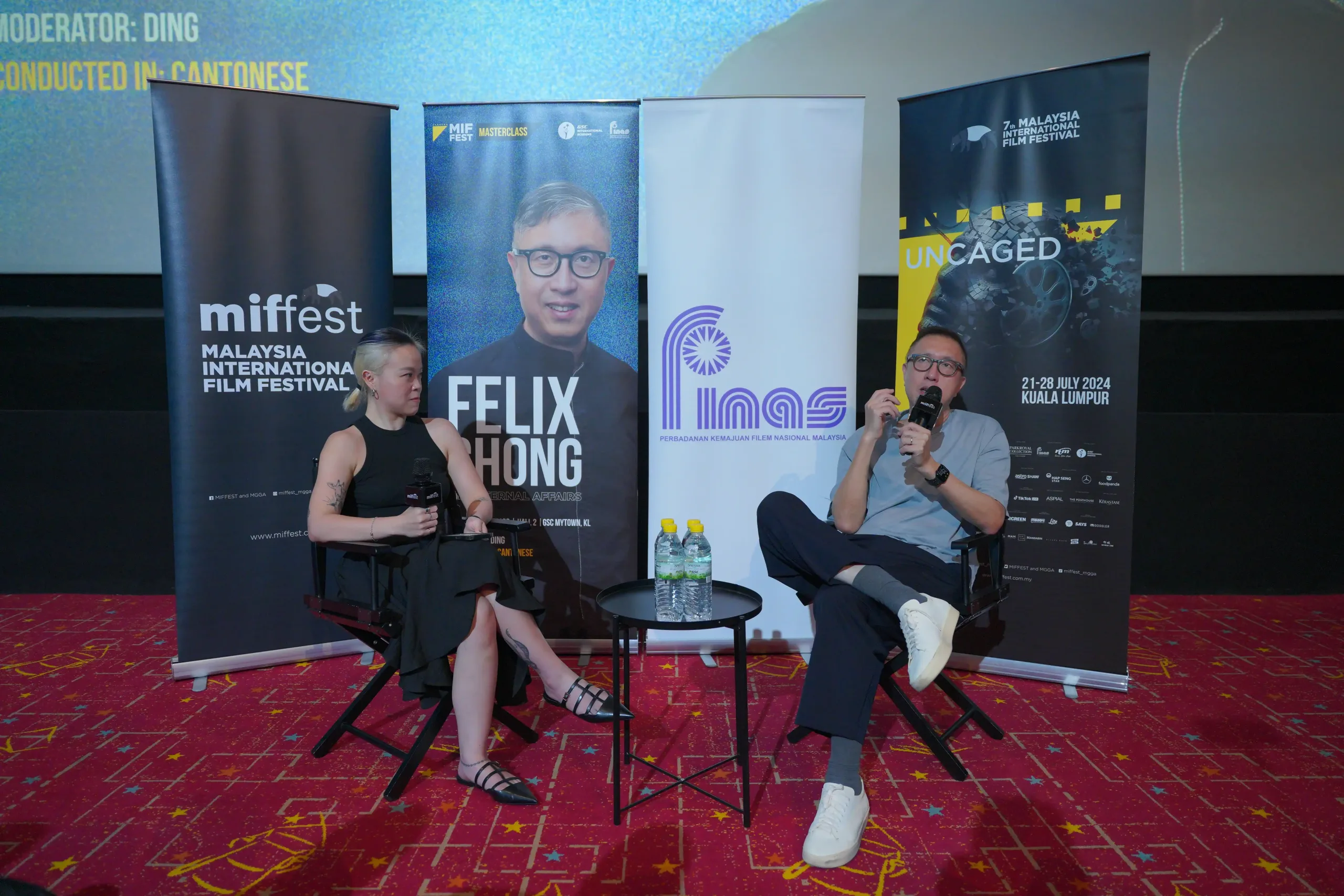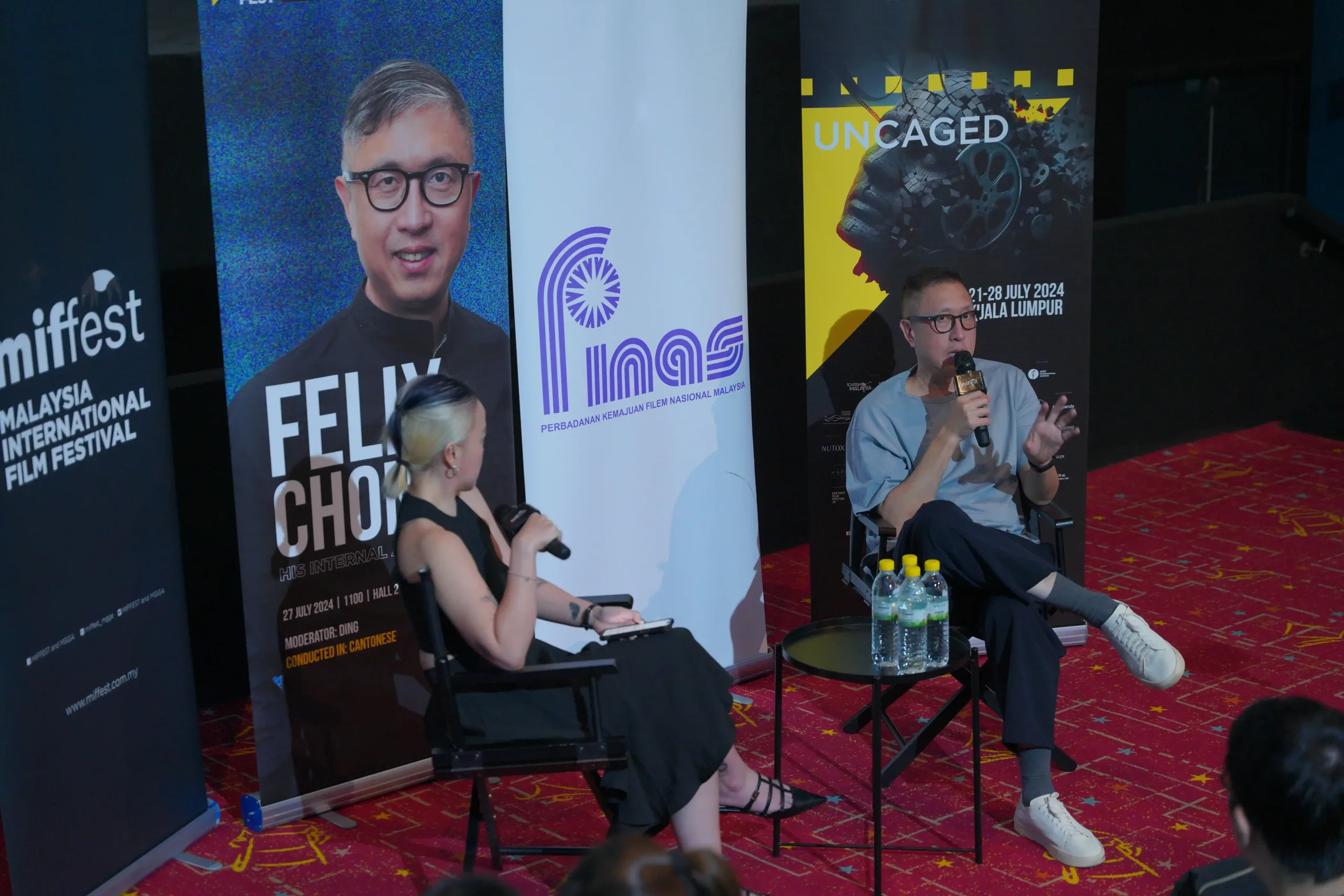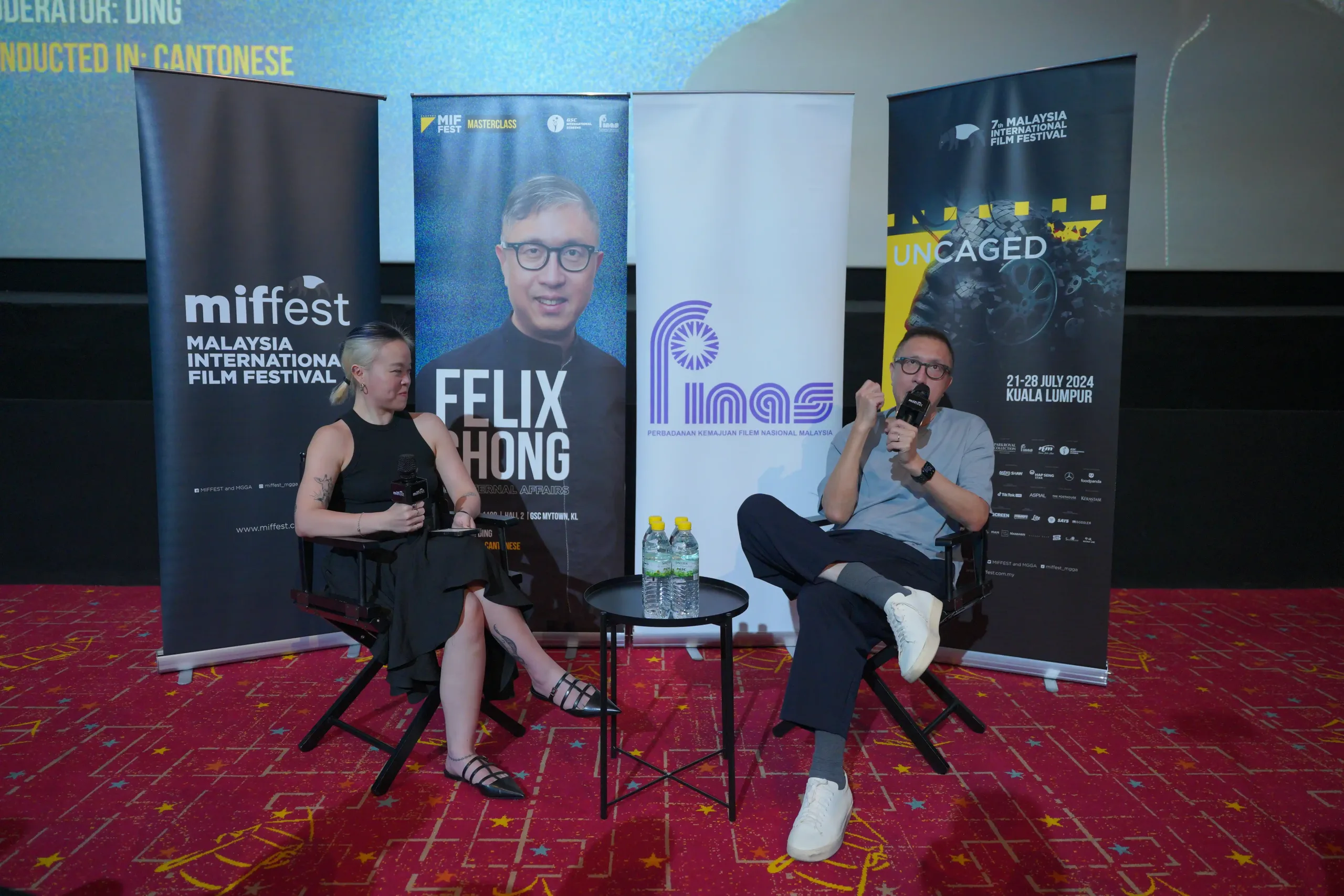KEY TAKEAWAYS: FELIX CHONG’S MASTERCLASS: HIS INTERNAL AFFAIRS

DING and Felix Chong.
SPEAKER(S)
Felix Chong
Felix Chong is a renowned screenwriter and film director from Hong Kong. He is highly celebrated and has received numerous prestigious awards at the Hong Kong Film Awards. His best known movie Project Gutenberg which won the Best Film, Best Director and Best Screenplay in 38th HKFAA. His other notable screenplay works include Infernal Affairs series, Initial D, Confession of Pain and Overheard series.
MODERATOR
DING
Felix Chong, a highly respected figure in Hong Kong cinema, has established himself as a visionary filmmaker, celebrated for his nuanced screenplays and skillful direction. Known for works like “Infernal Affairs”, “Overheard”, and “Project Gutenberg” Chong’s journey from television writer to award-winning director reflects his dedication to storytelling, collaboration, and constant adaptation to the ever-evolving demands of the film industry.
In a candid conversation, Chong sheds light on his experiences, the philosophy behind his work, and his distinctive approach to screenwriting and directing.

DING and Felix Chong.
Entering the World of Film: A Practical Start
Felix Chong’s path into filmmaking wasn’t born from instant success but rather a steady climb that began after his graduation from film school. Like many aspiring filmmakers, Chong took a practical route to sustain himself financially by working at TVB, Hong Kong’s premier television station. While working there, he honed his skills as a screenwriter, using every opportunity to write scripts, which eventually led him to be noticed by industry insiders.
His first significant breakthrough came when he worked on “Infernal Affairs”, a crime thriller that changed the landscape of Hong Kong cinema. This trilogy, co-written with Alan Mak, not only revived local interest in crime films but also garnered international recognition, inspiring Martin Scorsese’s “The Departed”.
Reflecting on his early days, Chong emphasises the importance of persistence. He knew that getting his foot in the door required more than just talent—it involved constant writing, self-promotion, and the ability to take criticism and learn from it. His time at TVB taught him not only about writing but also about the importance of effective communication in the creative process, which would later become essential in his work as a director.
The Art of Screenwriting: Collaboration and Communication
One of Chong’s strongest beliefs is that a good script is not enough by itself—it must be communicated effectively to directors, actors, and production teams. He recalls that early in his career, even when he wrote strong scripts, he often struggled to explain them to others. This led to miscommunications and frustrations on set, pushing him to improve his ability to articulate his vision.
Chong’s approach to screenwriting is deeply collaborative. He believes that filmmaking is a team effort, where every person, from the writer to the actor, must contribute to the story. Chong mentions that the script is merely a blueprint, and it’s only through collaboration—especially with actors—that a story truly comes to life. He frequently revises scenes based on actor input or the realities of the shoot, acknowledging that flexibility is key to making a good film.
In his opinion, writing a screenplay is more than just crafting dialogue and plot. It’s about understanding characters on a deep level, something he refers to as “entering the character.” Chong often immerses himself in the mindset of his characters, allowing their actions and decisions to naturally drive the story forward. This method, he believes, results in more organic and engaging storytelling.

DING and Felix Chong.

Felix Chong.
Directing: Navigating the Chaos of the Set
As a director, Chong’s philosophy is built around adaptability. He recounts numerous experiences where what was planned on paper couldn’t be executed due to logistical issues, changes in location, or even the mood of the actors. Rather than seeing these challenges as setbacks, Chong views them as opportunities to be creative. He believes that a director must always be ready to change course and improvise, as filmmaking is rarely a straightforward process.
One of the more humorous anecdotes he shares is about the unpredictable nature of directing, where a simple miscommunication with actors or crew can lead to hours of delay. Chong humorously points out that directing is often about problem-solving on the spot, whether it’s adjusting a performance or managing a technical glitch. It’s a skill he developed early in his career when he realised that meticulous planning often goes wrong once cameras start rolling.
Despite the chaotic nature of film sets, Chong remains calm under pressure, relying on his experience and instincts to guide him through. His ability to manage large teams, communicate his vision, and balance the creative needs of everyone involved has been a cornerstone of his success as a director.
Creating Crime Thrillers: Character-Driven Action
In “Infernal Affairs”, the tension arises not from physical confrontations but from the emotional and psychological duel between two characters on opposite sides of the law. Chong crafts multi-layered characters with conflicting motivations, allowing the audience to sympathise with both the hero and the villain. This moral ambiguity is a hallmark of Chong’s writing, where characters are never entirely good or evil.
Action in Chong’s films is used sparingly and only when it serves the story. He integrates action sequences to advance the plot, not just for spectacle. His action scenes are often imbued with emotional weight, adding depth to the violence rather than glorifying it.
Chong also brings humour into his crime films, using it to humanise his characters and provide moments of relief amid the tension. He views humour as a critical component in balancing the darkness of crime thrillers, making his films more relatable and engaging for audiences.

Felix Chong.

DING and Felix Chong.
The Future of Hong Kong Cinema and Felix Chong’s Legacy
Felix Chong is a firm believer that the future of cinema lies in the hands of storytellers who can adapt and collaborate. His experiences reflect a deep understanding of the complexities of filmmaking, from writing and directing to navigating the unique dynamics of Hong Kong’s film industry. He believes that the best filmmakers are those who are willing to evolve, communicate effectively, and embrace the chaos of production with creativity and openness.
Chong’s legacy in Hong Kong cinema is cemented not just by his box-office successes but by the depth and complexity of his storytelling. His films, which often explore themes of identity, loyalty, and morality, continue to resonate with audiences both locally and internationally. His work demonstrates that action-packed crime thrillers can also be intelligent, character-driven narratives that leave a lasting impact on viewers.
Felix Chong’s career is a masterclass in the art of filmmaking, blending meticulous screenwriting with dynamic directing. His ability to create compelling, character-driven narratives within the framework of crime thrillers has set him apart in Hong Kong cinema. Through his experiences, Chong shows that storytelling is as much about collaboration and communication as it is about creativity. As he continues to push the boundaries of the genre, his influence on the future of Hong Kong cinema is undeniable.











